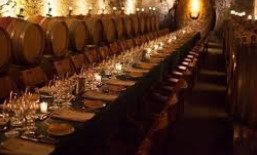History and Traditions of Wine

Wine has a history that goes back thousands of years, yet it is still an evolving story, with new regions producing wine. Wine has played an important part in peoples’ social lives from the time of ancient Greece, though it was considered the privilege of the upper classes. Dionysus, the Greek god of wine, represented the social and beneficial influences of wine as well as its intoxicating powers. Throughout history wine has also been an important industry in brining successful economies to countries producing wine.
From Asia, cultivation of grapes began to move west, first towards ancient Egypt where it became a major industry in the Nile River delta and from there it moved to Greece. From Rome, viticulture spread all through Europe. Across the Roman Empire different grape varieties and cultivation techniques developed.
From Europe, viticulture moved successfully across to the United States, South Africa, South America and Australia. The new climates and cultures created unique styles and flavours which became known as New World.
A brief outline of the history and traditions of wine
8,000 BC
The earliest known wine producers came from what is now modern day Georgia. Large earthenware vessels have been discovered that were used in winemaking. Even today, Georgia still uses earthenware vessels called Kvevri.
7,000– 6,600 BC
The ancient tribes from Jiahu, Henan Province, in the Yellow River Valley of China made a wine from rice, honey and fruit which was stored in earthenware jars.
4000 BC
Archaelogical finds in Armenia show there was a winery in Armenia that some historians say produced wine from 7000 BC
1600–1100 BC
Finds in Egypt and Mesopotamia indicate wine may have been transported in amphora and goatskins.

900 BC
In Northern Europe during the Iron Age, barrels were used to store and ship wine. Today, barrels are still used to season and oxidise wine.
400 BC
First historical mention of wine made from grapes in India.
40 BC
History states that Cleopatra’s favorite wine was Muscat of Alexandria, which is still made today.

1000
Château de Goulaine is built. This is said to be the world’s oldest operating vineyard
1100s
Monasteries develop vineyards in regions of Champagne, Burgundy and the Rhine Valley.
1300s - 1500s
Monasteries begin winemaking across continental Europe. With water often considered unsafe to drink, wine becomes commonplace as a drink not just for nobility but also the general population.

1600s
Production of glass reaches a level high enough to see an improvement in the transporting and storing of wine.
1650
In Bordeaux, Cabernet Franc and Sauvignon Blanc are crossed, by nature, to create Cabernet Sauvignon.
1718
Champagne Abbey produces a set of rules for vintners in which Chardonnay grapes were shunned.

1737
The first specific wine region in the world was created at Tokaj in the foothills of the Zemplén Mountains of Hungary. The demarcation was to protect the 1000 year tradition of the sweet white wine Tokaji Aszú.
1740
Bottles were redesigned so they could be laid on their sides, which meant they could age over time.
1857
The first commercial winery operation in California opened in Sonoma - the Buena Vista Winery. The reputation of vineyards in Australia, South America and New Zealand grew.

1864
First sighting of Phylloxera in France which destroyed much of the world's vineyards, outside of the America’s for nearly 20 years
1900s
With access to refrigeration, it has become easy for wineries to control the temperature of the fermentation process and produce high quality wines in hot climates.
1964
The first introduction of bag-in-a-box wines.

1976
The famous "Judgment of Paris" tasting saw Californian wine beat French wine for the first time.
1978
Robert Parker introduces The Wine Advocate which uses a 100-point wine rating system
2006
Italy is the world’s largest producer of wine. France is second and Spain third. If California was a nation, it would have taken fourth place.

2010
Cabernet Sauvignon is the world’s most planted wine grape.
2013
The world’s largest consumer of dry red wines is China.



